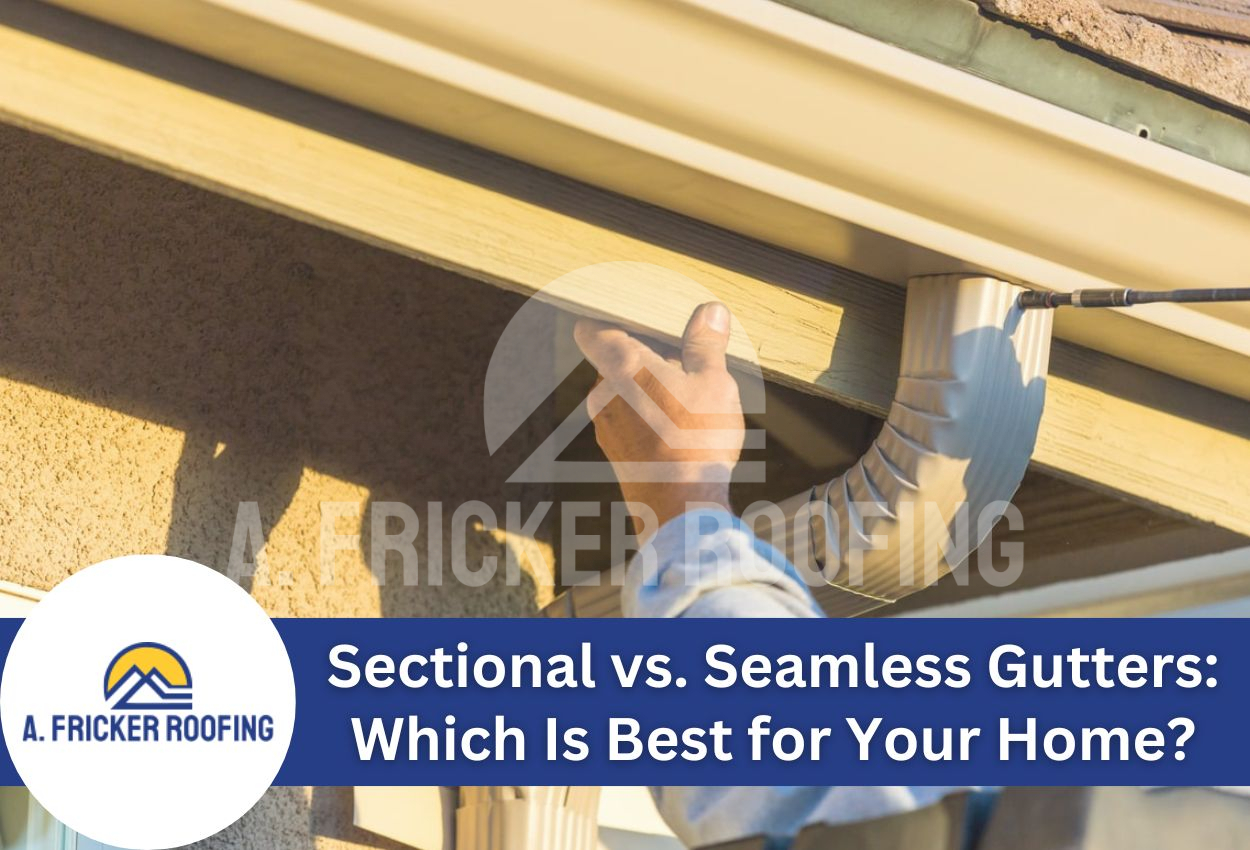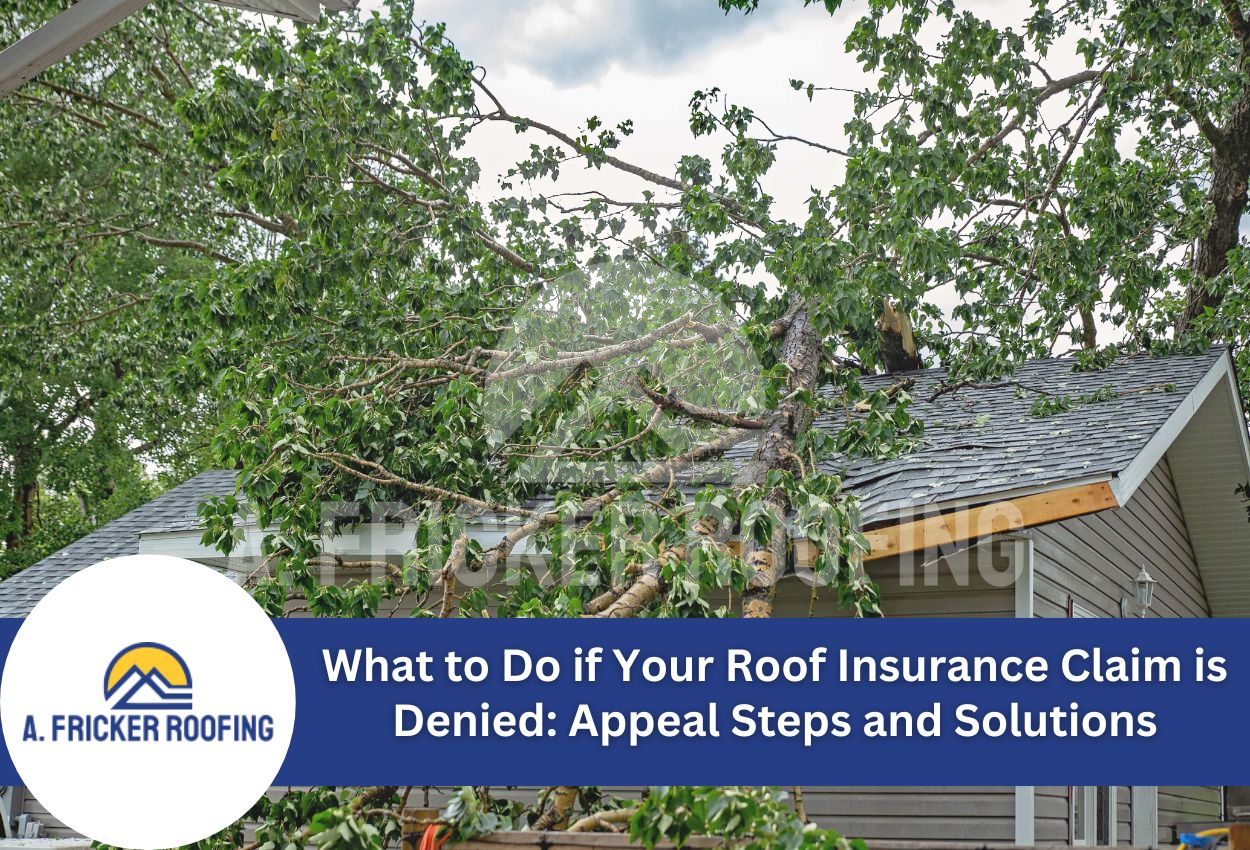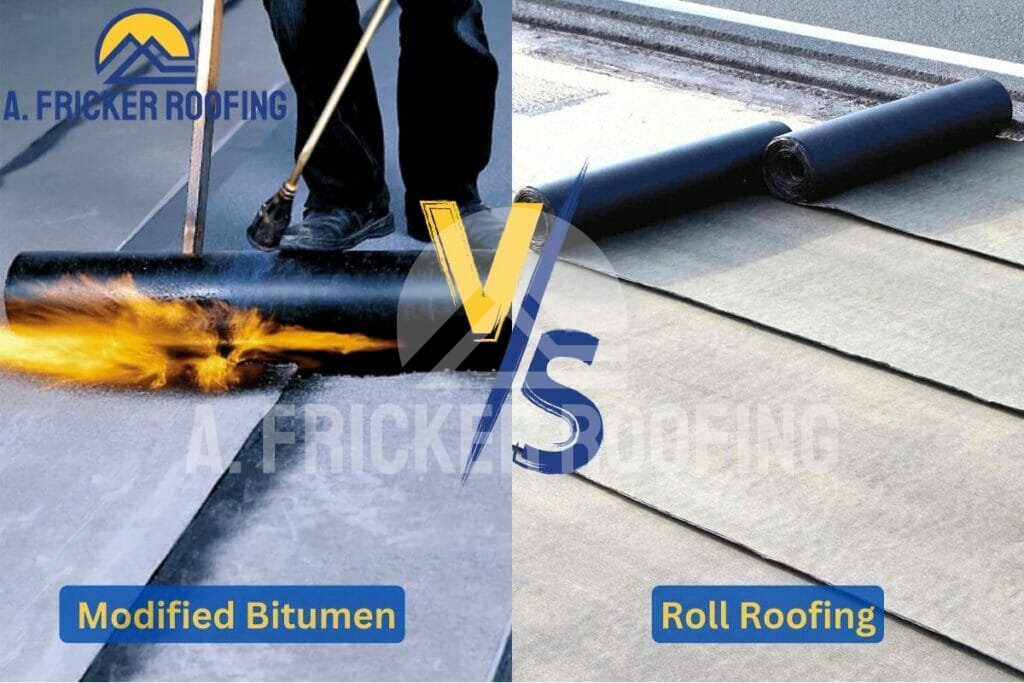
The only similarity between these two is the presence of asphalt. Other than that, modified bitumen and asphalt roll roofing have different compositions that are suitable for different types of buildings and locations.
Modified Bitumen Roofing
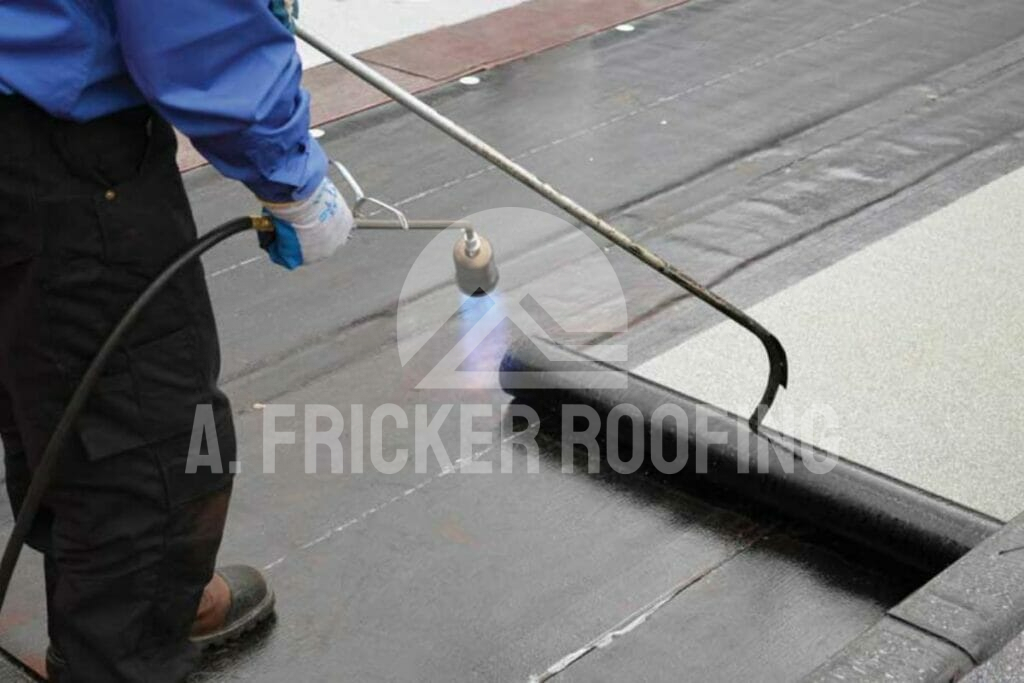
Modified bitumen roofing is composed of asphalt that has been modified with rubber or plastic polymers. These polymers enhance the flexibility and durability of the asphalt, making it less prone to cracking and weathering.
The roofing material is available in two types: SBS (styrene-butadiene-styrene) and APP (atactic polypropylene). SBS bitumen is more flexible and ideal for extreme weather conditions. On the other hand, APP bitumen is more resistant to UV rays and better for sunny locations. Modified bitumen roofing is typically installed in 2-ply or 3-ply systems by installation methods like welding/torching, cold application, or self-adhesion.
Roll Roofing
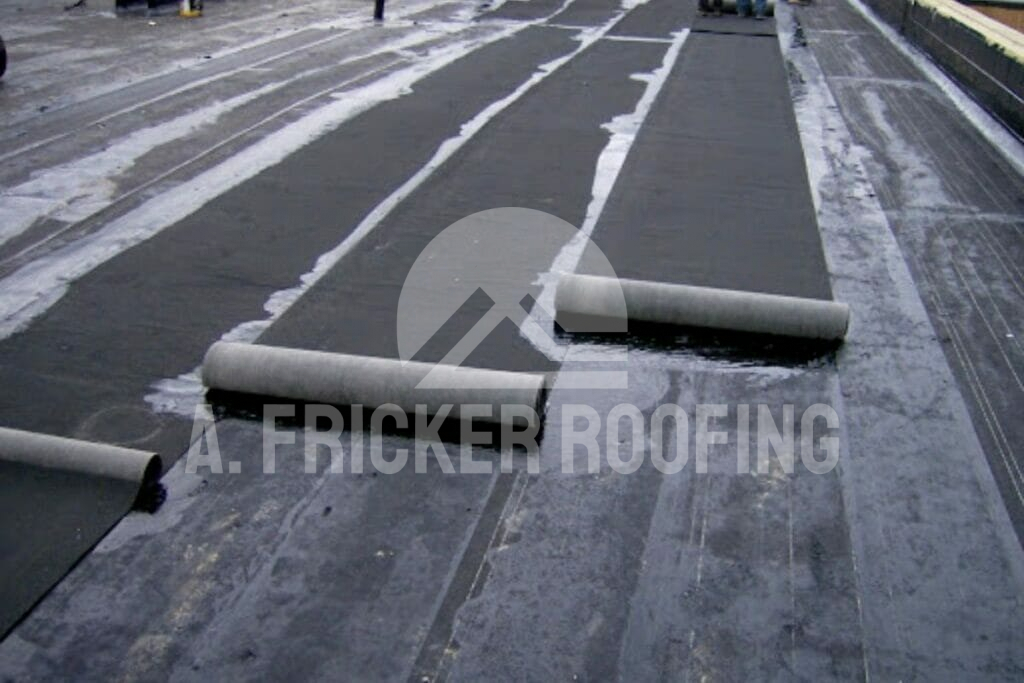
Roll roofing is made from asphalt and is similar to asphalt shingles used for residential roofing. However, instead of individual shingles, this roofing system is installed in large rolls that are typically 36 inches wide and 33 feet long. The rolls are covered with asphalt granules that provide protection against UV rays and the weather.
Asphalt roll roofing is available in two types: organic and fiberglass. Organic roll roofing is made from recycled, asphalt-saturated felt paper, while fiberglass roll roofing has a fiberglass mat base coated with asphalt. Both of them are installed by rolling out the material and securing it to the roof deck using nails, screws, or an adhesive method.
Now that you know what these roofing systems are made of, let’s learn about the pros and cons of both materials.
Modified Bitumen vs. Roll Roofing: What Are The Pros and Cons Of Each Material?
When choosing a roofing material, it’s best to know what each material has in store for you. In this section, we’ve highlighted the benefits of modified bitumen and roll roofing so you can compare and figure out which material will work best for your specific needs.
The Benefits Of Modified Bitumen Roofs
Most people look for a durable, cost-effective, and low-maintenance roofing material. Well, modified bitumen roofs provide all these benefits, plus a few more.
Durability:
Modified bitumen is a highly durable material that can last up to 20 years or more with proper installation and maintenance. It is resistant to weathering, cracking, and thermal shock, making it suitable for buildings in areas with extreme temperatures.
Versatility:
Modified bitumen can be used on both low-slope and steep-slope roofs. It is also available in a variety of colors and textures, making it a versatile option for buildings that require specialized design or coverage.
Resistance Power:
Modified bitumen has a resilient composition that can absorb the impact of small to medium-sized hailstones without cracking or breaking. It also performs better than roll roofs in rainy, snowy, and windy areas. Its multiple layers of reinforcement and tough composition hold it in place during stormy weather.
Energy Efficiency:
Modified bitumen roofing systems can help reduce energy costs, as the material reflects sunlight and reduces heat buildup on the surface. This results in lower cooling costs during the summer months.
Easy Repair:
Repairing a modified bitumen roof is relatively easy, as the damaged areas can be patched quickly with the same material. Then, all it needs is a reapplication of reflective coating to function properly again.
The Benefits Of Roll Roofing
Asphalt roll roofing isn’t appropriate for every location, but here are some major advantages you should know about:
Affordability:
Asphalt roll roofing is one of the most affordable types of roofing available. It is an ideal option for property owners who need a new roof but have a tight budget that may not support high-quality materials.
Easy Installation:
Roll roofing is easy to install, making it a popular choice for owners and roofers who don’t want to deal with an entire roof replacement or installation process. It requires minimal tools and equipment and can be installed in a short amount of time.
Lightweight:
Asphalt rolls are lightweight, making them suitable for buildings that cannot support the weight of heavier roofing materials. This is also helpful during the transportation of roofing materials.
However, no roofing material is 100% perfect. So along with its benefits, you should also know the drawbacks that come with these roofing materials. This is important for comparing which one is better for you and your needs.
The Drawbacks Of Modified Bitumen Roofing
Each concern may not necessarily be a drawback for everyone. It all depends on what you are looking for in a roofing material and how well it fulfills your requirements.
Cost:
Modified bitumen may cost more than a few other roofing materials, including asphalt rolls. That’s because it’s highly durable, and sturdy, and requires skilled labor for perfect installation. However, it’s more cost-effective in the long run since you don’t need to repair and replace it as often.
Maintenance:
While modified bitumen is relatively easy to repair, it requires regular maintenance to work at its maximum potential. Neglecting maintenance can result in the need for frequent repairs, but this is applicable to almost all roofing materials out there.
Environmental Impact:
Some people may feel that this roofing material isn’t very eco-friendly based on the chemicals that make it up, and that it may be harmful to the overall sustainable goal of protecting our planet.
The Disadvantages Of Asphalt Roll Roofing
If you’re looking for durability, cost-effectiveness, and maximum protection, roll roofing may not be the best choice. It’s only suitable for mild climates and a few types of roofs.
Durability:
Asphalt roll roofing is less durable than other roofing materials, with an average lifespan of around 8 to 15 years. It is more vulnerable to weathering and cracking, which may lead to leaks and the need for frequent repairs.
Resistance Power:
Roll roofing is not an ideal choice for areas that experience frequent hailstorms or high winds. That’s because the material isn’t made to withstand high impacts and can crack and leak under such conditions. Additionally, this roofing system is not entirely reliable during storms since its nails and adhesives may come off in high winds, leading to uplift and damage to the roof, wiring, plumbing, and other parts of the building.
Unsuitable For Certain Applications:
Asphalt rolls are not suitable for all types of roofs. They work well on flat roofs and sometimes on roofs with a slight pitch, up to 1 or 2 inches, but fare poorly when installed on roofs with a higher pitch.
After carefully comparing the above pros and cons, it is clear that modified bitumen roofing offers more advantages than asphalt roll roofing.
Who’s The Winner?
In the battle of modified bitumen vs. roll roofing, the clear winner is modified bitumen. Though its primary cost is higher, modified bitumen roofs are more cost-effective in the long run than asphalt rolls. These roofs also have superior durability, performance, and application method, making them worth every penny.
On the other hand, roll roofing can only stand up against the elements for a few years, and only after multiple repairs have occurred, which can ultimately increase the overall cost and take away your peace of mind.
So, if you live in an area where hail, heat, or thunderstorms are a common phenomenon, a modified bitumen roof is a better choice than asphalt roll roofing. It can protect your building for a long time and lower its energy costs, all without breaking the bank.
If you live in Tulsa, OK, or the surrounding areas, we can help you learn more about your roofing options.
Free Consultation For Modified Bitumen Roofs & Other Roofing Materials
If you’re in need of a durable roofing solution that can withstand extreme weather conditions, discuss your options with our experts. At A. Fricker Roofing and Waterproofing, we’ve been helping property owners for years. Our team of experienced roofing professionals specializes in installing high-quality roofing materials such as modified bitumen, TPO, and EPDM. We use the latest techniques to ensure a durable, long-lasting roof that provides protection and peace of mind. If you want to learn more about your options, we can offer you a free consultation and estimate on your project.
Call us at (918) 402-7167, and we will be happy to answer all your questions and provide proper guidance.


